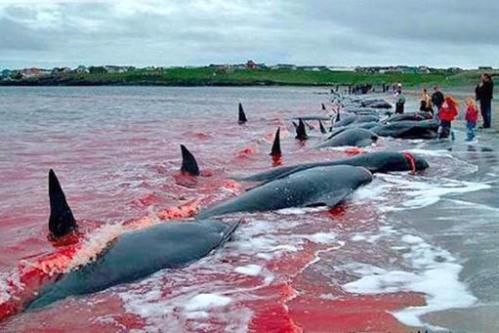导读:生命诚可贵,因此我们理所当然都很珍视。可是,当你看到鲜血染红海岸,鲸鱼躺死沙滩的场景,你还能说,这是文明人类对生命的敬畏吗?

Tossing and turning in a scarlet sea, the dozens of pilot whales cannot escape the knife blows raining down. Driven into the shallows, where they are forced to bathe in the blood of their relatives and companions, their distress is palpable as hunters hack at their smooth sides.
在被鲜血浸染的海水中一阵挣扎之后,几十余头巨头鲸始终是未能逃脱被乱刀刺死的厄运。它们会被驱赶至浅滩,被迫在自己的亲戚和伙伴的血液中翻腾,当捕鲸者向它们身体的柔软之处挥刀而去之时,悲伤不禁流露出来。
once they are dead — or, at least, dying — hooks and ropes haul their bodies ashore, where crowds of people, many of them children, have gathered to watch this bloodthirsty spectacle.
在它们死后——或者至少是奄奄一息之时——法罗人会用钩子和绳索将它们拖至岸上,此时的人们——大多数是小孩——已经聚集到一块儿来观看这一血腥的场景。
Tragically, the whales, the victims of this brutal human behaviour, are here as a result of their innate sense of loyalty. Such is their devotion to their extended family that if one member becomes stranded on land, the rest of the pod will remain with the stricken animal, even if they endanger themselves.
可悲的是,鲸鱼——人类野蛮行为的受害者——落得如此下场仅仅是由于它们与生俱来的忠诚感。若它们家族的其中一员搁浅海岸,那么其它成员便会守护在受伤的伙伴左右,即便自己面临生命危险,这就是它们对大家族的一份奉献。
This week, the Faroe Islands in the North Atlantic witnessed the latest grindadrap.
这一周,北大西洋的法罗群岛就发生了捕鲸活动。
A pod of whales was sighted off the islands and 25 boats set out in pursuit. In the course of two hours, the men herded the whales inshore.
一群鲸鱼消失在了岛屿的视线之内,于是便派出了25艘渔船进行追踪。2个小时后,这些人将鲸鱼驱赶至近海。
There, on Hvannasund Beach, the Faroese were waiting with their weapons. Of the 200 whales in the pod, 120 were killed.
在Hvannasund沙滩上,法罗人的兵器正跃跃欲试。200头鲸鱼,死了120头。
The culture of the Faroese people has long involved whaling. When the animals are sighted close to shore and conditions are calm enough, the call goes out — once by word of mouth, now by phone call and social media — and the islanders race to the water.
长期以来,法罗人的文化与捕鲸不无联系。当监测到鲸鱼靠近海岸,且风平浪静之时,便会有人发出信号——以前是通过口信,现在是通过电话和社交媒体——于是,岛上的居民便飞奔至海边。
Over the past three centuries, the Faroese have taken an average of 838 pilot whales each year, according to a 2012 study.
根据2012年的一项研究表明,在过去300年里,法罗人每年都会捕杀838头巨头鲸。
But the Faroese — who are semi-autonomous from Denmark — get upset when outsiders criticise them.
但是法罗人——丹麦半自治领土居民——面对外界批评时,感到闷闷不乐。
It is a long tradition, certainly, but longevity does not excuse brutality. We in Britain once had long traditions of bear and bull baiting, of cockfighting and of public executions, but our society became more civilised and so abandoned such bloodthirsty pastimes.
诚然,捕鲸是一个历史悠久的传统,但是时间长短并不能为其残忍性脱罪。我们英国人也有逗熊、逗公牛、斗鸡和公开处决的长远历史,但是我们的社会现在变得更加文明了,因此,我们摒弃了此类充满血腥的娱乐方式。
The Faroese claim that killing pilot whales is sustainable — their numbers are such that the deaths do not threaten the species — but that misses the point. Pilot whales may not be classed as endangered, but the slaughter of a large community of sentient beings does not seem to be justified by the argument that there are plenty more where they came from.
法罗人还扬言,捕杀巨头鲸是可持续性的——对于它们的数量而言,捕杀还不至于危及其种族——但是,他们忽略了要点。巨头鲸虽未被列入濒危物种,但是如此大规模地屠杀有感情的生物,其罪恶是不能通过物种的数量还有很多来洗清的。
The Faroese also claim that this activity is wholly legal.
法罗人却还坚称,他们的活动是完全合法的。
But, like sharks, cultures must keep moving forward or they die. It is time the islanders put an end to this shameful bloodshed on their beaches.
但是,跟猎杀鲨鱼一样,文化不是繁荣就是衰亡。法罗人也是时候结束这一令人蒙羞的沙滩流血活动了。